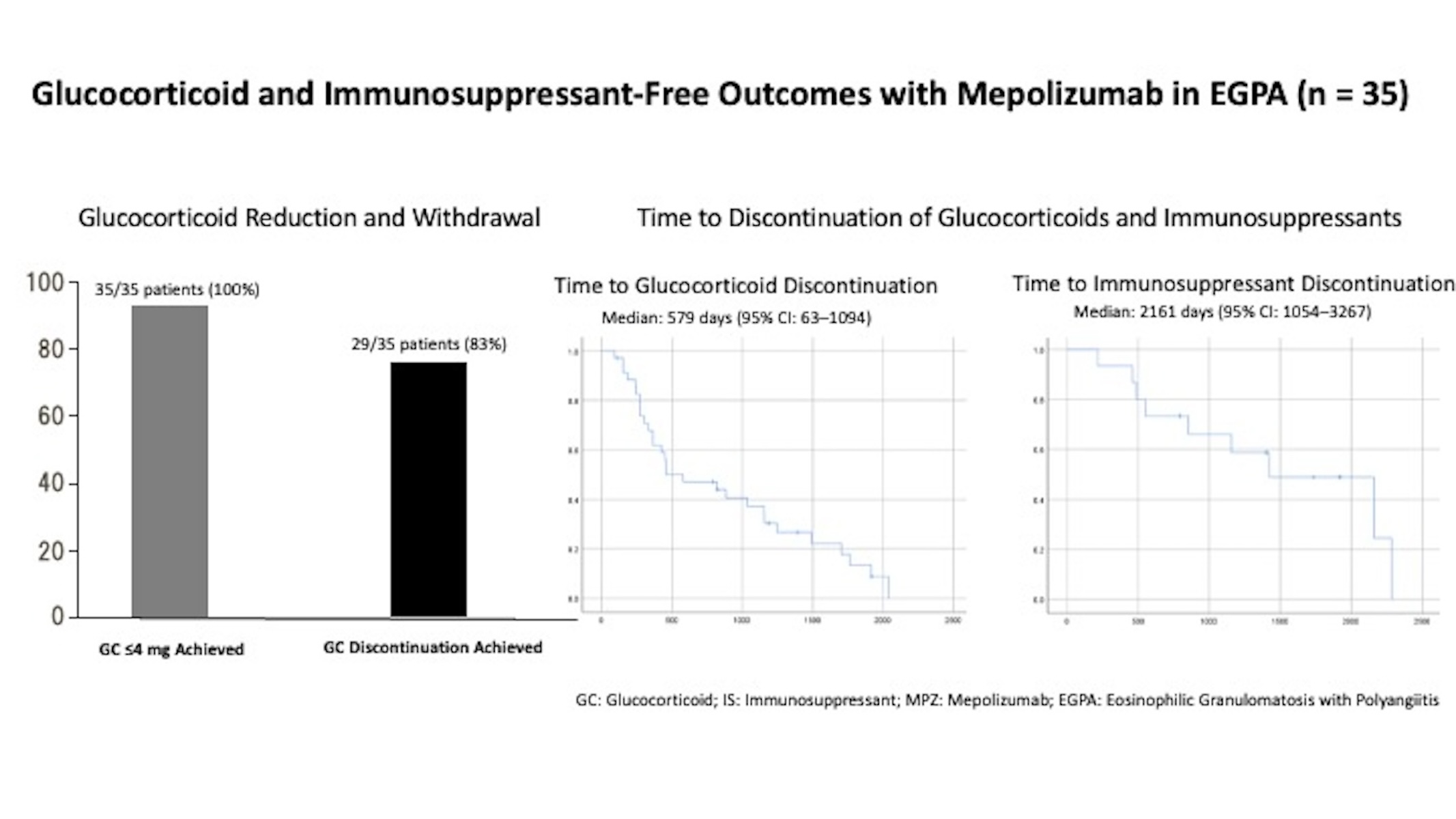Session Information
Session Type: Poster Session B
Session Time: 10:30AM-12:30PM
Background/Purpose: Mepolizumab (MPZ), an anti–interleukin-5 monoclonal antibody, has shown efficacy in reducing glucocorticoid (GC) dosage and sustaining remission in eosinophilic granulomatosis with polyangiitis (EGPA). This study investigated real-world outcomes of GC and immunosuppressant (IS) discontinuation, and the clinical predictors of successful shift to MPZ monotherapy.
Methods: We conducted a retrospective cohort study of 35 EGPA patients treated with MPZ and GC for ≥48 weeks. Patients were stratified by antineutrophil cytoplasmic antibody (ANCA) status and IS use. Outcomes included the proportion of patients achieving GC ≤4 mg/day and GC/IS discontinuation. GC exposure, time to withdrawal, and predictors were analyzed using Wilcoxon signed-rank, Mann–Whitney U, log-rank tests, and Cox proportional hazards models. Correlations were assessed by Spearman’s coefficient.
Results: All patients (35/35) achieved GC tapering to ≤4 mg/day. GC was completely discontinued in 29 patients (83%), and 13 (37%) discontinued both GC and IS, achieving sustained MPZ monotherapy. The median time to GC-free status was 579 days (95% CI: 63–1094), while the median time to IS-free status was 2161 days (95% CI: 1054–3267). A significant negative correlation was observed between time from GC initiation to MPZ initiation and total GC duration (ρ = 0.691, p < 0.001), suggesting the benefit of early MPZ initiation. ANCA-negative patients achieved GC-free status more rapidly than ANCA-positive patients (p = 0.038). IS use did not significantly affect GC discontinuation time, though non-IS users tended to discontinue GC earlier (p = 0.040).Univariate Cox regression identified female sex (HR 2.2, 95% CI: 1.0–4.5, p = 0.007), absence of neurological involvement (HR 0.3, 95% CI: 0.1–0.8, p = 0.021), and no history of relapse (HR 0.4, 95% CI: 0.2–0.9, p = 0.036) as significant predictors of GC/IS discontinuation. In multivariate analysis, neurological involvement remained an independent predictor (HR 0.3, 95% CI: 0.12–0.9, p = 0.035).
Conclusion: MPZ facilitated tapering to low-dose GC in all patients and enabled complete GC discontinuation in the majority, with some patients achieving IS-free status. Early MPZ initiation significantly shortened GC exposure. ANCA-negative status and absence of neurological involvement were associated with more favorable outcomes. These findings support the treatment with MPZ monotherapy as a feasible long-term treatment strategy in selected EGPA patients.
 Glucocorticoid and Immunosuppressant-Free Outcomes with Mepolizumab in EGPA (n = 35)
Glucocorticoid and Immunosuppressant-Free Outcomes with Mepolizumab in EGPA (n = 35)
.jpg) Correlation Between Time to Mepolizumab Initiation and Total Glucocorticoid Exposure
Correlation Between Time to Mepolizumab Initiation and Total Glucocorticoid Exposure
.jpg) Predictors of Combined Glucocorticoid and Immunosuppressant Discontinuation Under Mepolizumab Monotherapy
Predictors of Combined Glucocorticoid and Immunosuppressant Discontinuation Under Mepolizumab Monotherapy
To cite this abstract in AMA style:
Yamane T, Inoue A, Yasuda N, Ohnishi T, Hashiramoto A. Early Mepolizumab Initiation Enables High Glucocorticoid and Immunosuppressant Discontinuation Rates in EGPA: A Retrospective Cohort Study of 35 Patients [abstract]. Arthritis Rheumatol. 2025; 77 (suppl 9). https://acrabstracts.org/abstract/early-mepolizumab-initiation-enables-high-glucocorticoid-and-immunosuppressant-discontinuation-rates-in-egpa-a-retrospective-cohort-study-of-35-patients/. Accessed .« Back to ACR Convergence 2025
ACR Meeting Abstracts - https://acrabstracts.org/abstract/early-mepolizumab-initiation-enables-high-glucocorticoid-and-immunosuppressant-discontinuation-rates-in-egpa-a-retrospective-cohort-study-of-35-patients/
